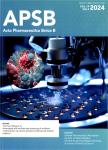Metal nanoparticles for cancer therapy:Precision targeting of DNA damage
作者机构:Institute of PharmaceuticsHangzhou Institute of Innovative MedicineCollege of Pharmaceutical SciencesZhejiang UniversityHangzhou 310058China Frontiers Science Center for Transformative MoleculesSchool of Chemistry and Chemical EngineeringNational Center for Translational MedicineShanghai Jiao Tong UniversityShanghai 200240China World Laureates Association(WLA)LaboratoriesShanghai 201203China Key Laboratory of Precision Diagnosis and Treatment for Hepatobiliary and Pancreatic Tumor of Zhejiang ProvinceHangzhou 310009China
出 版 物:《Acta Pharmaceutica Sinica B》 (药学学报(英文版))
年 卷 期:2024年第14卷第3期
页 面:1132-1149页
核心收录:
学科分类:1002[医学-临床医学] 07[理学] 070205[理学-凝聚态物理] 08[工学] 080501[工学-材料物理与化学] 0805[工学-材料科学与工程(可授工学、理学学位)] 100214[医学-肿瘤学] 10[医学] 0702[理学-物理学]
基 金:funded by National Key Research and Development Program of China(2022YFB3203804,2022YFB3203801,2022YFB3203800) the Leading Talent of“Ten Thousand Plan”National High-Level Talents Special Support Plan,National Natural Science Foundation of China(32071374,32000985) Program of Shanghai Academic Research Leader under the Science and Technology Innovation Action Plan(21XD1422100,China) Program of Shanghai Science and Technology Development(22TS1400700,China) Zhejiang Provincial Natural Science Foundation of China(LR22C100001,LQ21H300003,China) Innovative Research Team of High-Level Local Universities in Shanghai(SHSMU-ZDCX20210900,China) CAS Interdisciplinary Innovation Team(JCTD-2020-08,China)
主 题:DNA damage Metal nanoparticles Nucleus-targeting DNA repair inhibition Immune response Size optimization Stimuli-responsiveness Surface modification
摘 要:Cancer,a complex and heterogeneous disease,arises from genomic ***,DNA damage-based cancer treatments,including radiotherapy and chemotherapy,are employed in clinical ***,the efficacy and safety of these therapies are constrained by various factors,limiting their ability to meet current clinical *** nanoparticles present promising avenues for enhancing each critical aspect of DNA damage-based cancer *** customizable physicochemical properties enable the development of targeted and personalized treatment *** this review,we delve into the design principles and optimization strategies of metal *** shed light on the limitations of DNA damage-based therapy while highlighting the diverse strategies made possible by metal *** encompass targeted drug delivery,inhibition of DNA repair mechanisms,induction of cell death,and the cascading immune ***,we explore the pivotal role of physicochemical factors such as nanoparticle size,stimuli-responsiveness,and surface modification in shaping metal nanoparticle ***,we present insights into the challenges and future directions of metal nanoparticles in advancing DNA damage-based cancer therapy,paving the way for novel treatment paradigms.



